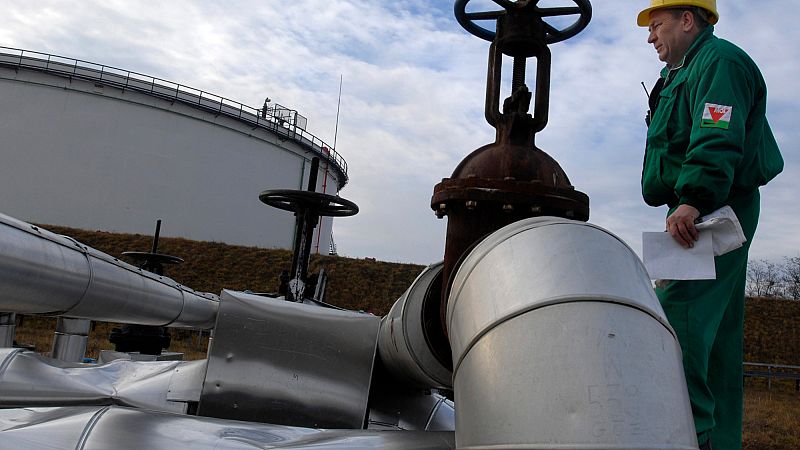Hungary and Slovakia under pressure as US and EU target Russia with energy sanctions

Hungary and Slovakia will be increasingly pressured to phase out Russian fossil fuel imports as the EU and US begin to collaborate to target Russia's war economy, an analyst has told Euronews.
The two central European nations are the last remaining importers of Russian pipeline oil.
"The (EU's) goal of phasing out Russian fossil fuels aligns with American energy dominance policy. So I think that's the direction of travel. And I think Hungary and Slovakia will be squeezed on that front," Eammon Drumm, research analyst at the German Marshall Fund of the United States, told Euronews.
The Trump administration and the European Union held talks on Monday in Washington, including the EU's sanctions czar, David O'Sullivan, to consider how to pressure Russia's economy with further sanctions to weaken Putin's war machine, days after US President Donald Trump confirmed that his country was prepared to impose additional sanctions on Russia.
One goal could be to hit the importers of Russian fossil fuels, like India or China, with secondary tariffs. This alone would not affect individual EU members, even if they continue importing oil or gas.
"I think that it's likely that Hungary and Slovakia will not be targeted directly by secondary sanctions from the US, because that would jeopardise the terms of the US-EU trade deal, in which there was a significant agreement on energy purchases," Drumm said.
Political pressure mounts from Washington to drop Russian oil
European Commission President Ursula von der Leyen told MEPs at her State of the Union speech that it's time for Europe to "get rid of the dirty Russian energy as soon as possible".
And days ago, an unnamed EU official told CNBC that energy dependency on Russia will be targeted more vehemently.
US Energy Secretary Chris Wright told the Financial Times that if Europe expects the US to step up sanctions against Moscow, its member states must halt oil and gas imports.
A source from the White House told the New York Post a week ago that the Trump administration wants Europe to stop buying Russian oil.
The EU banned Russian oil imports in 2022, but Hungary and Slovakia secured derogations, as the two landlocked countries have limited alternative routes.
Hungary's Foreign Minister Péter Szijjártó said last week that his country buys Russian oil because it has no alternative routes for importation.
"Buying energy is a physical issue. You can buy energy from whichever pipeline arrives here," Szijjártó said. The Hungarian minister has also denied that Trump wants Hungary to stop buying Russian oil.
But Drumm said that Hungary and Slovakia will not be able to ignore the pressure and will eventually need to rid themselves of Russian energy.
"I suspect that over the coming years, Hungary and Slovakia, to a lesser extent, will continue to seek additional support, funding carve-outs from the EU on these questions," Drumm said.
"I think they will push it to the last possible minute, but I think that the momentum towards phasing out Russian fossil fuels is there. It's not going to go away."
The EU plans to phase Russian energy from the bloc completely by 2027 in its REPowerEU roadmap, opposed by Hungary and Slovakia. But replacing existing infrastructure is costly, and the two countries might hope to boost EU funding for their diversification.
"If this were to have an impact on Hungary, it would be through extracting more support from the EU for diversification efforts, because the replacement of Russian oil and gas, to a lesser extent, is costly, adds complexity, and there are challenges with the infrastructure as well," Drumm explained.
Hungary is already moving to diversify imports
Drumm noted that the EU-US trade deal accounts for an increase in energy imports from the US, worth $750 billion, until the end of the presidential term of Donald Trump in 2029. But it's tricky for Slovakia and Hungary to contribute to these imports without ports.
Drumm thinks that though they will be strongly encouraged to diversify their energy imports, this won't necessarily be from the US, "because of the complexity of getting US fossil fuel imports to landlocked countries."
Rather, he said, Norway, Azerbaijan and other regional and Middle Eastern players might be more plausible alternative sources.
Another reason for diversification is the lack of security affecting supplies arriving via the war zone. Lately, Ukraine has frequently attacked the Druzhba oil pipeline on Russian territory, effectively halting imports for a day.
Despite rejecting EU calls to abandon Russian fuels, Hungary seems to be moving in this direction when it comes to natural gas imports.
Szijjártó announced on Tuesday that Hungary signed a long-term natural gas purchase contract with Shell, which concerns the purchase of 2 billion cubic metres of natural gas over 10 years, starting in 2026.
The minister hailed the agreement as the biggest of its kind with a Western company. "We hope that this contract will serve as a flagship, which will be followed by smaller and perhaps larger ships in the future," Szijjártó concluded.
Today

